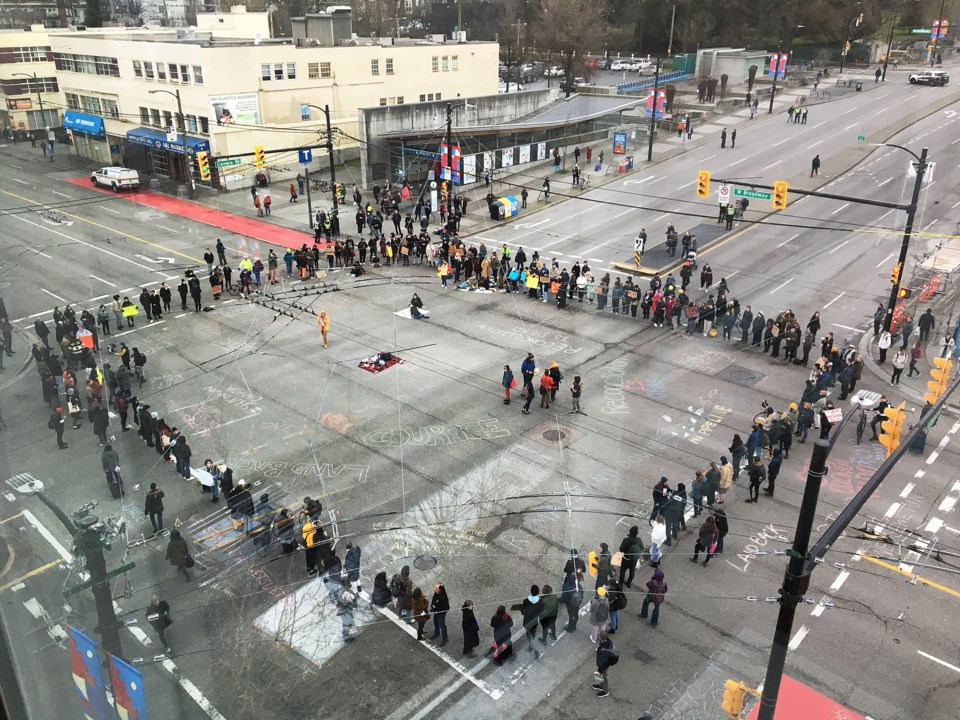If you have yet to be impacted by the #ShutDownCanada protests that are stalling tens of thousands of travelers and commuters, or choking supply lines for goods in our ports, donât worry, itâs only a matter of time before our whole economy feels it.
For those whoâve had a bus re-routed or have been unable to take the West Coast Express, or for others stuck in traffic thanks to protestors occupying an intersection, it might have meant missing a job interview, or being late to pick up a child or a pet from daycare, or giving up any hope of getting to a medical appointment.
The evident lack of concern for an average citizenâs autonomy boils down to the ethical lapse of protest organizers, who believe the nobility of their cause supersedes the interests of other Canadians.
Note the blockading of access points in in Victoria this month â which of course has its own hashtag: #BCGovtShutdown. Someone shared with me a to a freely available document that I was shocked to see listed all major government offices in Victoria, including notes on the location of building entrances, and the estimated number of protesters needed to block each one of them.
Incredibly, itâs alleged that many protesters involved in the shutdown, or crashed the B.C. Legislative Assembly a few days beforehand, were from classes by their UVIC professors, who are public employees themselves.
Some of us will recall that government offices have also been the target of terrorism, such as in Oklahoma City where a bomber took 168 lives.
What kind of person thinks to target dozens of government offices to prevent employees moving in or out of a workplace? Or what group or organization is responsible for facilitating the work that went into creating a spreadsheet that pairs protesters with side entrance of a public building?
Through the , protest organizers can meet and mobilize mass actions while remaining completely anonymous.
It has been astonishing lately to witness just how vulnerable our institutions, ports and transportation networks are. Margareta Dovgal, director of research at Resource Works Society, a B.C.-based non-profit providing information on responsible resource development, is not surprised however.
Dovgal says Canada is an âincredibly great targetâ for those who seek attention for an array of concerns. I interviewed her for my latest podcast episode.
âIâve seen how in the environmental space, the fact that Canada has this amazing concern and responsiveness to the publicâs needs,â said Dovgal. âIâve seen how that characteristic of our governance is easily used by outsiders who want global and national environmental solutions.â
Indeed, there is plenty of precedent for what she describes.
In his on the Clayoquot Soundâs âwar in the woodsâ protests of the early 1990s, Â Environmental Groups and the International Conflict Over the Forests of British Columbia, UBC professor emeritus Bill Stanbury gives detailed insights into the environmental protest movement. Stanbury, who died in 2011, was praised by a Canadian Centre for Policy Alternatives economist for his âremarkable mind.â
Of the protests, Stanbury wrote that their ânoble causeâ bred self-righteousness among leaders and fervent followers. âWhen powerful interest groups become imbued with the idea that the end justifies the means, violations of ethical norms are likely to follow.â He went on to list many of them.
Years before others promoted the idea, Stanbury documented how protesters âinternationalizedâ domestic environmental disputes, in particular how some American capitalists flush from a boom in the tech sector, poured millions into charitable foundations to support environmental causes in Canada.
Stanbury explains how protesters exploit our legal system too by imposing the cost of their safety on the police and our court system. Barricades are usually erected in the presence of police, who in turn must protect their civil rights against those who would tear them down.
Stanbury also questioned the ethics of involving children in protests too, calling it âutterly irresponsibleâ to put them in harmâs way. No doubt he could have foreseen that the modern face of climate activism would be in her teens.
Itâs as if Canadians are resigned to this loss of our sovereignty. As Stanbury noted back in 2000, âthe transient legion of activistsâ taking up their fight on our streets and rail right-of-ways have made our country a âglobal battlefield.â
***
Listen to the Â鶹´«Ã½Ó³»Overcast podcast for Mike Klassen interview with Margareta Dovgal at .



